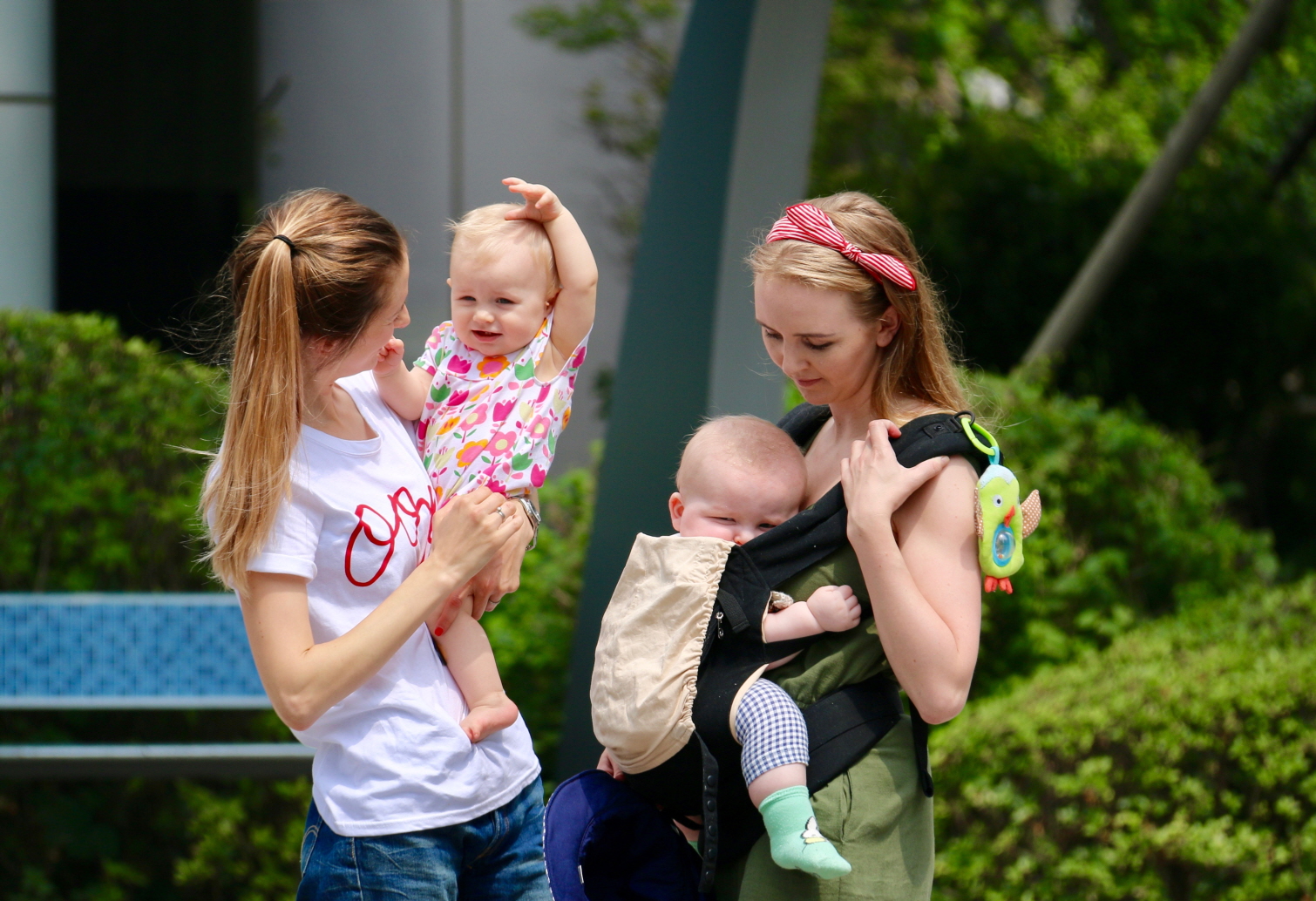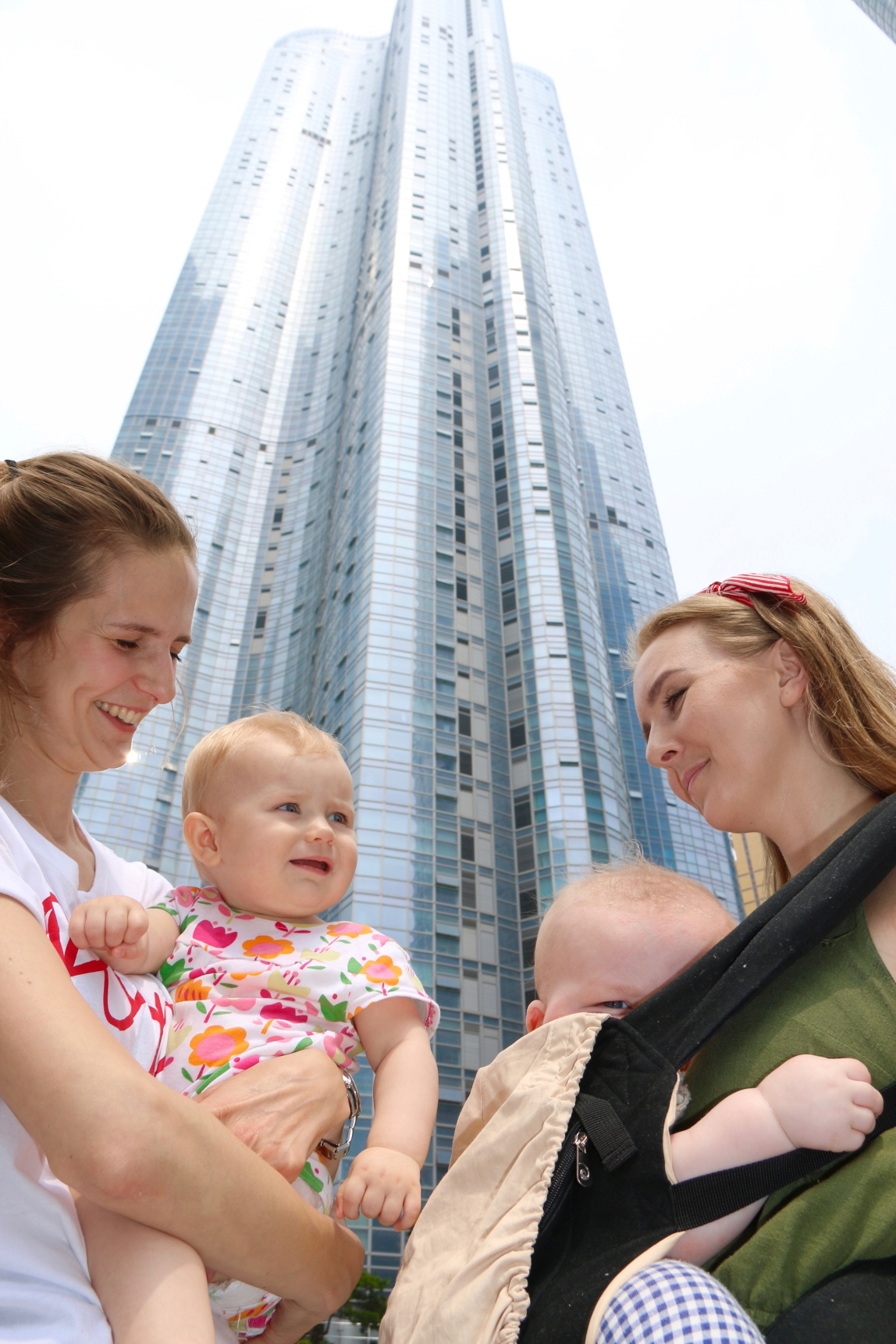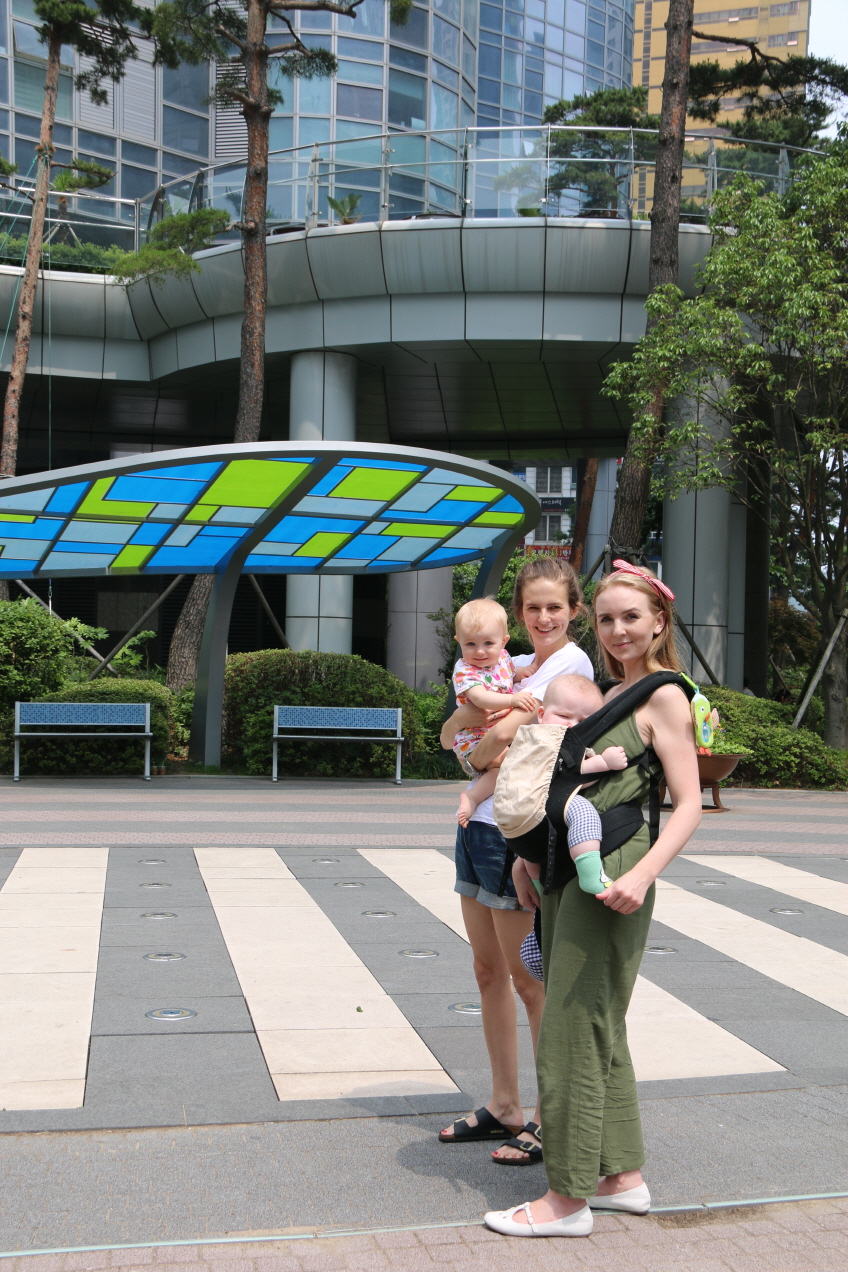Giving birth in Busan
엄마는 위대하다! 부산에서의 출산경험

Eline Gammelsæter and Ava (left) Mia Askevold and Lavrens (right)
엘린(Eline Gammelsæter)과 아바(Ava) (왼쪽) / 미아(Mia Askevold)와 라브랑스(Lavrens) (오른쪽)
“Don’t be scared! They give birth to numerous children in Busan. Back home in Norway, there were several people asking, how do you have the courage to give birth in Korea? Then I got a bit irritated, of course they know how to deliver babies in Korea too” Eline Gammelsæter, Norwegian expat.
When Eline had her baby the 17th of July she only experienced one minor misunderstanding due to language challenges. The doctor was wearing a face mask and just before she began labor, he asked; “Can you listen to me? And I thought yes, yes I am listening to you, but nothing else was said!?– well the doctor just wanted to make sure I could hear his voice an meant to ask 'Can you hear me?'” Eline laugh.
No doubt it is easier to express your emotions using your mother language, but the doctor at Ellium Woman´s Hospital spoke English and Eline also got an interpreter, who was present during all the hospital checks through out her pregnancy.
“You are served plenty of seaweed soup, but you don’t have to eat it, and taking a shower right after giving birth is not recommended, but if you do it anyway nobody will stop you” Eline explains. Obviously, as international advised, no soap.
Mia Askevold, Norway, gave birth to Lavrens at the same hospital likewise conclude it all went well though Mia was skeptic from the beginning. “I didn’t want to have my child in Korea, I wanted to be where I felt at home together with family and friends, I would have preferred to have a Norwegian midwife and follow the traditions I´m used to but it all went fine.”
One important issue for Eline and Mia were to keep the newborn next to them right after giving birth. Different hospitals have different traditions, some separate mother and child for the first 7 hours due to the argument the mother needs rest and the newborn needs special observation. That procedure made Mia change hospital during her pregnancy as she found proximity between mother and newborn vital.
The frequency of cesarean might also be an issue. The discussion is often framed ideologically as a matter of nature versus technology, for some cesarean is modern obstetrical care, others find it an unnecessary risk. Whether you are pro or con, it is worth noting that in 2015, 38% percent of all live births in South Korea were performed by cesarean section - in Finland it was
15.5%.
Some foreigners have babies that are considered big in Korea, and that might push the doctor to suggest cesarean, “ but I argued I´m big too and my baby's proportions was fine for me” Eline explains, “to me the cesarean is like an emergency exit”. Eline made it clear she only wanted cesarean to be an option in case life or health of either her or her baby were threatened.
For both ladies it was their second child, therefore, they had an idea how their bodies might react. That helped Mia keep her selfconfidence. As Mia didn’t produce milk right away the hospital staff got worried and insisted Mia should give her baby artificial milk; “I had to fight a bit to avoid that solution. They actually asked if I wanted to starve my baby, but I know that breastmilk doesn’t come right away sometimes it might even take some days and under normal conditions that is OK”, At that moment Mia felt it was
important she was confident and had experience, and a few hours later Mia was able to breastfeed. Her son is now 8 months old and already 14 kilos!
Generally Mia and Eline find facilities and procedures in Busan very modern. At every check-up during pregnancy there was a scan “from the middle of May to the middle of June I got six scans, in Norway you get one during your pregnancy” Eline explains “but every time I had to remind them not to tell me the gender!”
In Korea , fathers have not traditionally been present during delivery, but Ellium Women's hospital is eager to modernize that tradition - in fact Mia, who didn´t want her husband present during delivery, had a hard time to make the staff understand being modern is also to be able to leave the dad outside the room, if that is what the woman giving birth wants.
Both women have advice for expats planning to give birth in Busan. Though they emphasize as women we are all different so what is normal for one isn’t necessarily normal for the other – and just because we are all expats doesn’t mean we have the same expectations and traditions.

“무서워하지 마세요! 부산에서도 수많은 아이들이 태어난답니다. 노르웨이에서도 종종 질문을 받아요. 어떻게 한국에서 아이를 낳을 마음을 먹었어요? 그럼 저는 조금 짜증이 나서 대답해요. 당연히 한국 사람들도 어떻게 아이를 낳는지 아니까요.” 노르웨이인 엘린(Eline Gammelsæter) 씨가 말했다.
엘린이 아이를 낳던 7월 17일에는 의사소통 문제로 인한 작은 해프닝을 겪었을 뿐이다. 마스크를 쓴 의사는 엘린이 막 힘을 주기 직전 이렇게 물었다. “제 목소리 들려요?” 엘린이 웃으며 말을 이었다. “전 계속 ‘네, 들려요’하고 생각했는데 더 이상 아무 말씀도 없으시더라고요. 알고 보니 제가 말을 들을 수 있는지 확인하려던 거였어요.”
물론 감정을 표현하는 데는 모국어가 최고이지만, 엘리움 여성병원 의사는 영어를 할 줄 알았고, 엘린의 곁에는 입원부터 분만까지 함께 해준 통역사도 있었다.
“미역국이 많이 나오지만 꼭 먹을 필요는 없어요. 샤워도 하지 않는 편이 좋다고 말하지만 샤워를 한다 해도 말릴 사람은 없고요.” 하지만 비누를 사용하지 말라는 충고는 만국 공통인 모양이다.
노르웨이인 미아(Mia Askevold) 역시 같은 병원에서 아이를 낳았다. 처음에는 걱정도 많았지만 출산은 별탈 없이 이루어졌다. “한국에서 아이를 낳고 싶지 않았어요. 가족과 친구들이 있는 편안한 장소에서 아이를 낳고 싶었죠. 노르웨이인 조산사와 함께 제게 익숙한 방식으로 아이를 낳고 싶었어요. 하지만 돌아보면 모두 다 잘 풀렸네요.”
엘린과 미아에게 중요한 이슈 중 하나는 출산직후 아기와 바로 함께 있을 수 있냐는 것이었다. 병원마다 규칙이 좀 다른데, 어떤 곳에서는 산모가 충분히 휴식하고 신생아는 병원에서 신경 써서 관찰할 수 있도록 첫 7시간 동안 산모와 아이를 분리시키기도 한다. 하지만 출산 직후 엄마와 아이가 붙어 있는 것이 아이에게 도움이 된다고 판단한 미아는 병원을 바꾸었다.
제왕절개 역시 산모에게 주요 쟁점 중 하나이다. 제왕절개에 대한 논쟁은 대개 자연주의 대 기술의 문제로 여겨진다.
또 다른 사람들은 불필요한 위험부담으로 여긴다. 당신이 제왕절개에 찬성하든 반대하든 다음과 같은 사실을 알아둘 필요가 있다. 2015년에는 한국에서 태어난 신생아의 38%가 제왕절개로 태어났다. 핀란드의 제왕절개 출산율은 15.5%이다.
외국인 신생아 중에서는 한국에서 우량아로 여겨질 만큼 큰 아이들도 있어, 산부인과 의사들이 제왕절개를 권하기도 한다. 하지만 엘린은 이렇게 말한다. “산모인 저도 크니까 제 아이가 커도 자연분만이 가능하다고 말했어요. 저에게 제왕절개는 어쩔 수 없는 경우에만 선택하는 선택지였거든요.” 엘린은 산모 또는 아이의 생명이나 건강에 위협이 있는 경우에만 제왕절개를 원한다고 못박았다.
엘린과 미아 모두 한국에서 둘째 아이를 출산했기에 출산 후 어떤 증상을 겪을지 이미 알고 있는 상태였다. 그 사실이 미아에게 큰 힘이 되었다. 첫 아이 출산 때도 출산 직후에는 모유가 나오지 않았던 미아는 병원 관계자들이 걱정하며 분유를 권유할 때에도 흔들리지 않았다. “분유를 먹이지 않겠다고 강경하게 버텨야 했어요. 병원 측에서는 아이를 굶길 거냐고 묻기까지 했지만, 제 경우엔 출산 후 모유가 나올 때까지 몇 일이 걸렸거든요. 정상적이고 문제없는 상황이었죠.” 미아는 그 때 첫 아이 출산 경험이 매우 힘이 됐다고 느꼈다. 몇 시간 뒤에는 모유 수유도 가능했다. 미아의 아들은 현재 8개월이며 몸무게도 14킬로그램이나 된다!
미아와 엘린은 부산의 시설이나 절차가 전반적으로 매우 현대화 되었다고 생각한다. 임신 기간 중에는 매 검사 때마다 초음파 검사를 받았다. “5월 중순부터 6월 중순까지 6번의 초음파 검사를 받았어요. 노르웨이서는 임신 기간 동안 초음파는 한 번만 받아요. 매번 초음파 때마다 아이의 성별을 말하지 말아달라고 말씀 드렸어요.” 엘린이 말했다.
한국에서는 전통적으로 출산 시 남편이 함께하는 경우가 잘 없지만, 엘리움 여성병원에서는 보다 현대화된 방식을 따르기 위해 노력하고 있었다. 출산 시 남편이 들어오는 것을 원치 않았던 미아는 병원 측에 진정 현대화된 방식이란 산모가 원하는 경우 남편을 분만실 밖으로 내보낼 수도 있어야 한다고 설득해야 했다.
엘린과 미아는 부산에서 출산을 계획하는 외국인 여성에게 이렇게 조언한다. “우리 모두는 같은 여성이지만, 나에게 일반적인 것이 다른 사람에게도 그렇다는 보장은 없습니다. 모두 다 다른 문화권에서 왔기 때문이죠. 또한 우리 모두가 여성이라고 해서 같은 기대치나 전통을 가지고 있는 것도 아닙니다.”

Advice for birthing in Korea!
1) Do your research.
1) 조사하라.
Read Blogs, Facebook groups, and homepages where people share their experiences.
블로그, 페이스북 그룹, 홈페이지 등에서 공유하는 경험담을 읽어라.
2) Write a letter in English and Korean explaining how you want the birth to be.
2) 출산에 대해 원하는 바를 영어 및 한국어로 작성해 설명하라.
Make sure the relevant doctor and midwife get a copy. Make decisions about clyster, cesarean, should the dad be present, should the newborn be next to you all times. Will you leave after 24 hours or 14 days?
의사나 조산사가 설명문을 전달 받았는지 확인하라. 관장, 제왕절개, 남편의 분만실 동행 여부, 출산 후 아이와 산모가 계속 같은 방에 지내고 싶은지, 몇 시간 또는 며칠 후에 퇴원하고 싶은지 등에 관한 결정을 내려라.
3) Medical professionals might not be as used to taking instructions from the “patient” as in your home country.
3) 한국 의사들은 고국의 의사들만큼 “환자”들의 의견을 듣는 데 익숙하지 않을 수도 있다.
It is not normal practice for medical professionals to explain what is going to happen or to answer questions - but keep asking.
앞으로 어떤 일을 겪을지 설명하지 않거나 질문에 대한 답을 얻지 못할 수도 있다. 하지만 계속 질문하라.
4) Be prepared it is different.
4) 다름에 대비하라.
Remember the staff do what they believe is best for you. Their intentions are to help you. Of course, the definition of what is best for you might vary. Be open-minded and have self-confidence.
의사들은 당신에게 가장 도움이 되는 선택을 한다는 것을 명심하라. 그들이 무엇을 하든 모두 당신을 도우려는 것이다. 물론 ‘당신에게 가장 도움이 되는 선택’의 정의는 다양하지만 마음을 열고 자신감을 가져라.
Contributing Writer l Lisbet Bratland (리즈벳 브랫랜드)

I´m a 56-year-old journalist. I moved to Busan in 2016. Back in Denmark I worked with radio and TV broadcasting for 26 years, mainly as an anchorperson. Coming from a country with lots of low pressure, rain, sleet and snow during the winter I just love Busan’s dry and blue autumn and winter seasons.
리즈벳은 올해로 56살이며, 기자 출신이다. 2016년 부산에 온 리즈벳은 덴마크에서 라디오, TV 등 방송 분야에서 26년간 앵커로 일했다. 저기압, 비, 진눈깨비, 눈이 많은 나라 출신이라 부산의 건조하고 청량한 가을과 겨울을 좋아한다.

